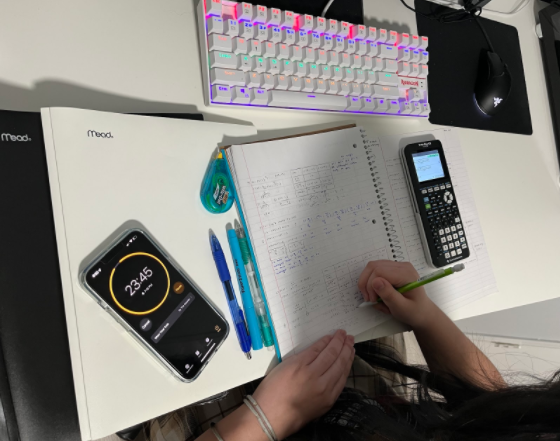Work smarter, not harder

Freshman Ly Cao uses the Pomodoro method in a study session on Feb. 7th for an upcoming math test.
February 16, 2022
It’s the long, dreaded night before a final. The whole night is spent to cram for hours, focused on the same words in an effort to memorize all the information, but the content just does not seem to stick.
Studies have shown that the mindless perusal through notes is not an effective method of studying; it doesn’t help process the actual information.
“The way I studied before would take much longer compared to now. When I found out about this specific studying style and integrated it into my routine, I became a lot more organized and was able to plan, as well as utilize the most of my time while studying,” said freshman Alex Smolin.
To make a study session as effective as possible, one should consider a method that makes an individual think through the content and retain the information, such as the Pomodoro method.
“The Pomodoro method by and large seems to be the most effective method I have encountered in person and reading through research,” said physics teacher, Ryan Guenthner.
The method consists of 25-minute, timed intervals, with a 5-minute break at the end of each interval. It was created by Francesco Cirillo, who titled the technique “Pomodoro,” named after the tomato-shaped kitchen timers he used as a university student.
“I would add that it is important not to study for more than two hours at a time, as after that, even results from the Pomodoro method drop off significantly. Recent research has shown that the breaks built into the method actually provide the brain with benefits similar to those of sleep. In other words, the break time is important for allowing your brain to organize and retain the information you were studying,” said Guenthner.
Although the Pomodoro technique can be time adjusted, the 25-minute interval is common because it’s the ideal length of time to help students not procrastinate, be the most productive, and helps to keep focus.
“I personally really like using the Pomodoro method because I’m able to be productive and manage my time effectively. The timer helps me stay focused for the time I work, while also giving me breaks to stretch, grab a snack, etc.,” said junior Jumana Zara.
Besides study methods, use psychology or brain physiology to improve retention and recall abilities.
One example is using scent; the scent of a specific Chapstick, for example, that is used while studying and applied right before a quiz helps the brain recall the information since this content was learned when the same scent was used.
“Almost everything we do both before and after studying interferes with the way the brain processes information. The only exception to this is sleep. By studying the first thing in the morning or as the last thing you do before bed, you eliminate half of the interference which could affect how your brain stores information,” said Guenthner.
Recent studies have shown that a healthier lifestyle is positively correlated with higher academic performance while high-stress level environments have led to a negative influence on the student.
Even just a 5-minute walk prior to a test significantly increases blood flow to the brain, which directly corresponds to efficiency and performance.
“I know that students have been told and heard of this a billion times, but the effects of diet, exercise, and sleep on academic performance simply cannot be understated,” said Guenthner.

